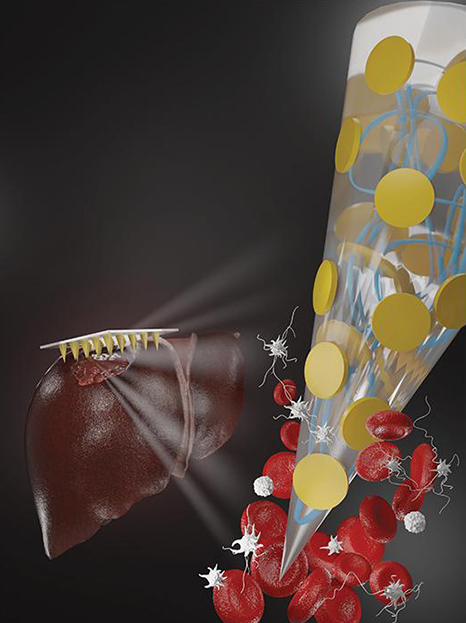Scientists at Penn State have developed a microneedle bandage that can rapidly stop bleeding. Uncontrolled bleeding following a traumatic injury is a major cause of death in the young, and developing new medical technologies that can rapidly stop bleeding would be highly beneficial. This bandage contains an array of biodegradable and biocompatible microneedles made using a gelatin methacryloyl biomaterial. The device also contains silicate nanoplatelets that give it its hemostatic properties, and the needle structure increases the surface area for blood contact and helps to bind the bandage to the injured tissue.
Blood loss is a leading cause of death for Americans under the age of 46. If a traumatic injury occurs, then stopping blood loss is the first priority. Blood loss from some injuries can be stopped by applying a tourniquet, but this isn’t possible in every situation and for every injury. A ready-to-use, highly effective hemostatic bandage would be a particularly useful component in first aid kits or military field kits as a first-line defense against these situations.
“Excessive bleeding is a serious challenge for human health,” said Amir Sheikhi, a researcher involved in the study. “With hemorrhaging injuries, it is often the loss of blood — not the injury itself — that causes death. There is an unmet medical need for ready-to-use biomaterials that promote rapid blood coagulation.”
These researchers turned to microneedle arrays as a means to stop bleeding. Medgadget has reported on microneedle bandages before, but typically they are conceived as a means of drug or vaccine delivery. In this paradigm, the microneedles act to significantly increase the surface area of the bandage that contacts the blood emerging from the wound, and increase the adhesion between the bandage and the wound, which also helps with wound closure.
So far, the researchers have tested the bandage in a rat liver bleeding model, where it showed impressive efficacy and reduced bleeding by approximately 92% compared with an untreated control group. The bandages also outperformed a commercial hemostat in reducing bleeding.
“In vitro, the engineered microneedle arrays reduced clotting time from 11.5 minutes to 1.3 minutes; and in a rat liver bleeding model, they reduced bleeding by more than 90%,” said Sheikhi. “Those 10 minutes could be the difference between life and death.”
Study in journal Bioactive Materials: Tissue adhesive hemostatic microneedle arrays for rapid hemorrhage treatment
Via: Penn State
